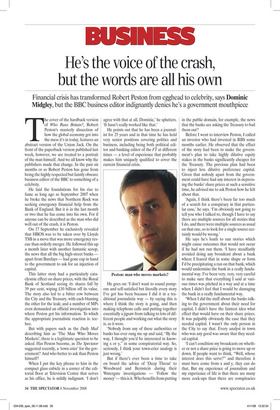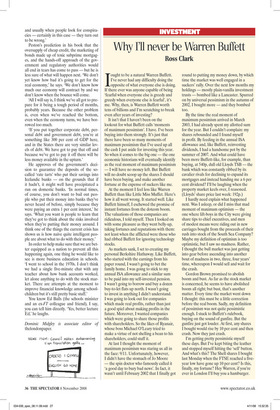He’s the voice of the crash, but the words are all his own
Financial crisis has transformed Robert Peston from egghead to celebrity, says Dominic Midgley, but the BBC business editor indignantly denies he’s a government mouthpiece The cover of the hardback version of Who Runs Britain?, Robert Peston’s masterly dissection of how the global economy got into the mess it’s in today, features an abstract version of the Union Jack. On the front of the paperback version published last week, however, we are treated to a portrait of the man himself. And we all know why the publishers made that change. In the past six months or so Robert Peston has gone from being the highly respected but faintly obscure business editor of the BBC to something of a celebrity.
He laid the foundations for his rise to fame as long ago as September 2007 when he broke the news that Northern Rock was seeking emergency financial help from the Bank of England. But it is in the last month or two that he has come into his own. For if anyone can be described as the man who did well out of the crash, it is Peston.
On 17 September he exclusively revealed that HBOS was to be taken over by Lloyds TSB in a move that was more emergency rescue than orderly merger. He followed this up a month later with another fantastic scoop, the news that all the big high-street banks — apart from Barclays — had gone cap in hand to the government to ask for an injection of capital.
This latter story had a particularly cataclysmic effect on share prices, with the Royal Bank of Scotland seeing its shares fall by 39 per cent, wiping £10 billion off its value. The story also led to a bitter row between the City and the Treasury, with each blaming the other for the leak; and a number of MPs even demanded an official investigation into where Peston got his information. To which the appropriate journalistic reaction is: teehee.
But with papers such as the Daily Mail describing him as ‘The Man Who Moves Markets’, there is a legitimate question to be asked. Has Peston become, as The Spectator suggested recently, a ‘town crier’ for the government? And who better to ask than Peston himself?
When I put the key phrase to him in the compact glass cubicle in a corner of the editorial floor at Television Centre that serves as his office, he is mildly indignant. ‘I don’t agree with that at all, Dominic,’ he splutters. ‘It hasn’t really worked like that.’ He points out that he has been a journalist for 25 years and in that time he has held very senior positions covering politics and business, including being both political editor and banking editor of the FT at different times — a level of experience that probably makes him uniquely qualified to cover the current financial crisis.
He goes on: ‘I don’t want to sound pompous and self-satisfied but literally every story I’ve got has been because I did it in a traditional journalistic way — by saying this is where I think the story is going, and then making telephone calls and putting together essentially a jigsaw from talking to lots of different people and working out what the story is, as it were.
‘Nobody from any of these authorities or banks has ever rung me up and said, “By the way, I thought you’d be interested in knowing x or y,” in some conspiratorial way. So, seriously, I think your town-crier analogy is just wrong.’ But if there’s ever been a time to take on board the advice of ‘Deep Throat’ to Woodward and Bernstein during their Watergate investigations — ‘Follow the money’ — this is it. Who benefits from putting in the public domain, for example, the news that the banks are asking the Treasury to bail them out?
Before I went to interview Peston, I called an investor who had invested in RBS some months earlier. He observed that the effect of the story had been to make the government’s plan to take highly dilutive equity stakes in the banks significantly cheaper for the Treasury. The previous plan had been to inject less dilutive preference capital. Given that nobody apart from the government could have had any interest in depressing the banks’ share prices at such a sensitive time, he advised me to ask Peston how he felt about that.
‘Again, I think there’s been far too much of a search for a conspiracy in that particular case,’ he says. ‘I’m obviously not going to tell you who I talked to, though I have to say there are multiple sources for all stories that I do, and there were multiple sources as usual on that one, so to look for a single source certainly would be wrong.’ He says he’s loath to run stories which might cause outcomes that would not occur if he had not run them. ‘I have steadfastly avoided doing any broadcast about a bank where I feared that in some shape or form I’d be precipitating a run on that bank, which would undermine the bank in a really fundamental way. I’ve been very, very, very careful to make sure that everything I said at various times was pitched in a way and at a time when I didn’t feel that I would be damaging the bank in a really fundamental way.
‘When I did the stuff about the banks talking to the government about their need for capital, I didn’t have the faintest idea what effect that would have on their share prices. It was palpably obviously the case that they needed capital. I wasn’t the only person in the City to say that. Every analyst in town who was any good was aware that they needed capital.
‘I can’t condition my broadcasts on whether or not a share price is going to move up or down. If people want to think, “Well, whose interest does this serve?” and therefore it must have come from x and y, they can do that. But my experience of journalism and my experience of life is that there are many more cock-ups than there are conspiracies and usually when people look for conspiracies — certainly in this case — they turn out to be wrong.’ Peston’s prediction in his book that the oversupply of cheap credit, the marketing of bonds made up of toxic subprime mortgages, and the hands-off approach of the government and regulatory authorities would all end in tears has come to pass — but he is less sure of what will happen next. ‘We don’t yet know how bad it’s going to get for the real economy,’ he says. ‘We don’t know how much our economy will contract by and we don’t know when the bounce will come.
‘All I will say is, I think we’ve all got to prepare for it being a tough period of months, probably years. Because the other problem is, even when we’ve reached the bottom, even when the economy turns, we have borrowed too much.
‘If you put together corporate debt, personal debt and government debt, you’re at something like 300 per cent of GDP here, and in the States there are very similar levels of debt. We have got to pay that off and because we’ve got to pay it off there will be less money available in the upturn.’ He approves of the government’s decision to guarantee the deposits of the socalled ‘rate tarts’ who put their savings into Icelandic banks — on the grounds that if it hadn’t, it might well have precipitated a run on domestic banks. ‘In normal times, of course, you don’t want to bail out people who put their money into banks they’ve never heard of before, simply because they were paying an extra 1 per cent interest,’ he says. ‘What you want is people to learn that they’ve got to think about the risks involved when they’re putting their money around. I think one of the things the current crisis has shown us is how naive quite intelligent people are about what to do with their money.’ In order to help make sure that we are better equipped as a nation to prevent all this happening again, one thing he would like to see is more business education in schools. ‘I went to school in the 1970s. I don’t think we had a single five-minute chat with any teacher about how bank accounts worked, let alone anything to do with the stock market. There are attempts at the moment to improve financial knowledge among schoolchildren but it’s still pretty basic stuff.’ You know Ed Balls (the schools minister and an ex-FT colleague and friend), I say, you can tell him directly. ‘Yes, better lecture Ed,’ he laughs.



















































































 Previous page
Previous page